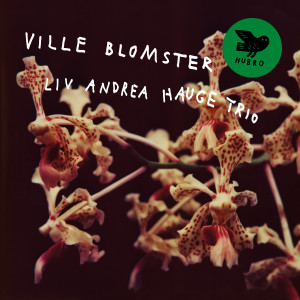 This trio’s first studio album opens with what could be a classical solo piano piece, a lilting parlor waltz with a hint of jazz in a couple of blue chords. But over its five minutes it slowly opens up into a mesmerizing jazz trio work as bassist Georgia Collins and drummer August Glännestrand join pianist Liv Andrea Hauge in an exercise of empathetic listening and playing. The tune “Det vokser ville blomster på månen,” (Wild flowers grow on the moon) gives the album Ville Blomster its title (wild flowers) and beautifully introduces this trio whose members are among an upwardly mobile group of young musicians in Norway’s jazz scene.
This trio’s first studio album opens with what could be a classical solo piano piece, a lilting parlor waltz with a hint of jazz in a couple of blue chords. But over its five minutes it slowly opens up into a mesmerizing jazz trio work as bassist Georgia Collins and drummer August Glännestrand join pianist Liv Andrea Hauge in an exercise of empathetic listening and playing. The tune “Det vokser ville blomster på månen,” (Wild flowers grow on the moon) gives the album Ville Blomster its title (wild flowers) and beautifully introduces this trio whose members are among an upwardly mobile group of young musicians in Norway’s jazz scene.
The trio’s members come by their obvious tight connections by dint of hard work. Only together a couple of years, they’ve spent most of the time playing together in live settings since they recorded their debut Live from St. Hanshaugen in Hauge’s living room only a couple of weeks after they got together. I was immediately reminded of one of my favorite recordings of the past decade, Stefan Aeby’s Utopia, by its overall sound and vibe and the attentive nature of the musicians’ interactions with each other. And by the similar way the musicians seem grounded in European jazz traditions but also are questing to move things forward.
I particularly enjoy the second track “Gullregn,” especially Hauge’s lovely “solo” passage right near the end, which begins with a composed passage of near unison play with bassist Collins, followed by a percussive true piano solo, a false ending marked by some subtle cymbal-and-brush swishes from Glännestrand, and a coda in which they restate the opening head.
The date gets more experimental as it progresses. Hauge plays a stately warm melody almost chamber-like in nature, while her mates create all manner of unusual sounds on the double bass and kit in “Vår” and likewise on the final track “Ødemarka” (Wasteland); “Asta” slides from a similarly sober piano piece to a bluesy freeform exploration. “Fri Flyt” probably needs no translation as it seems to be entirely freely improvised. But “Istid” (Ice Age) goes in the opposite direction to some of the other pieces, starting with a seemingly disorganized free improv and warming to a hopeful composed tune before once again heading into free territory of cool northern chords and bass and drums that emphasize more what they leave out than what they play.
“Ville Blomster” is altogether an impressive program of modern European piano jazz, with the quality of production all around that is expected from Hubro.
(Hubro, 2024)
